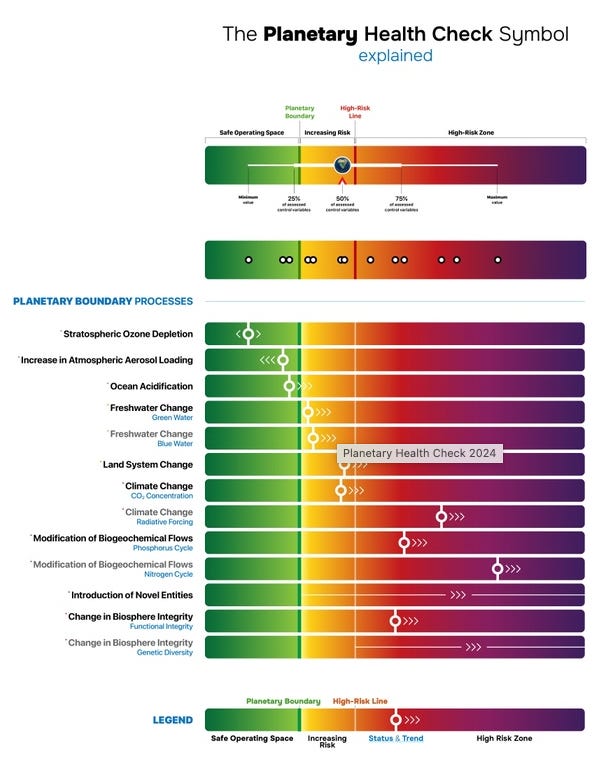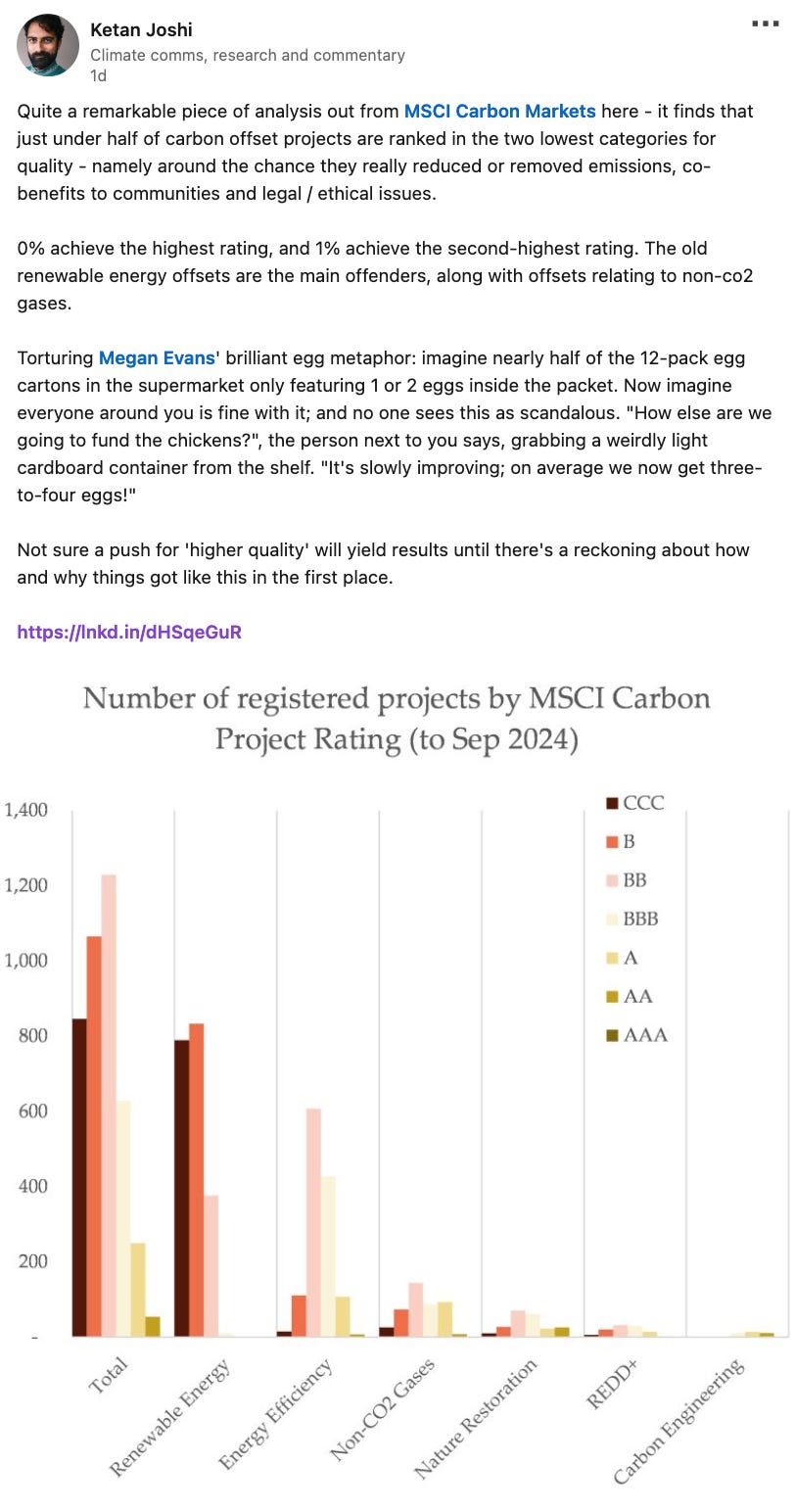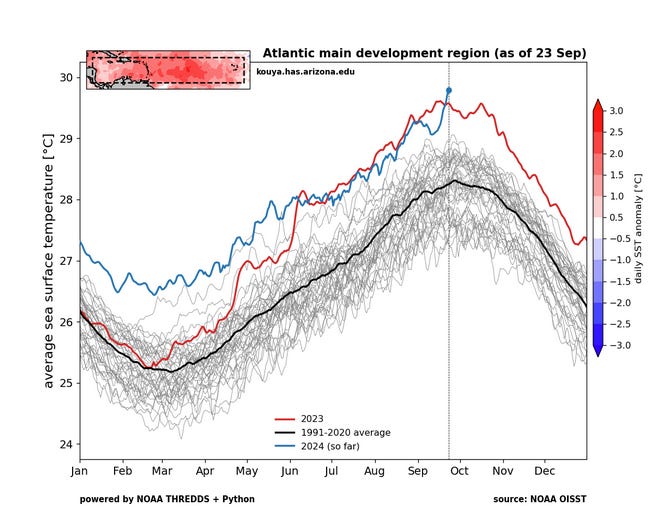Long stories short, here’s the top six news items of note in climate news for Aotearoa this week, and a discussion above between Bernard Hickey and The Kākā’s climate correspondent Cathrine Dyer:
A seventh planetary boundary, for ocean acidification will soon be breached, and may have already done so, according to a new report from The Potsdam Institute for Climate Impact Research (PIK).
A new study published in Science from 485 million years of data suggests a doubling of carbon dioxide (CO2) in the atmosphere could increase global mean surface temperatures (GMST) by 8˚C in the very long run, which is much more than previously thought.
Governments can trigger positive social tipping points by adopting climate mandates requiring key sectors to adopt clean energy technologies by specific dates, according to a new report.
New Zealand’s gas industry boasted about its success in preventing legislation that it regarded as an ‘existential threat’ to its business from being adopted. It said it used advertising and “discussions with Ministers and officials to help craft its message.”
GNS Science confirms that 59 jobs are to go as part of public sector cuts, including those of senior scientists, amounting to around 10% of the crown agency’s total workforce.
A new report shows achingly slow progress in improving the integrity of global carbon markets. Nearly half of the projects assessed fell into the bottom two integrity categories, while none achieved a triple-A rating and just 1% got a double-A rating.
(See more detail and analysis below, and in the video and podcast above. Cathrine Dyer’s journalism on climate and the environment is available free to all paying and non-paying subscribers to The Kākā and the public. It is made possible by subscribers signing up to the paid tier to ensure this sort of public interest journalism is fully available in public to read, listen to and share. Cathrine wrote the wrap. Bernard edited it. Lynn copy-edited and illustrated it.)

1. Seventh planetary boundary soon to be breached
The world’s oceans are close to a critical threshold, and may already have breached it according to a new report from the Potsdam Institute for Climate Impact Research (PIK).
“The world's oceans are close to becoming too acidic to properly sustain marine life or help stabilise the climate.
The report by the Potsdam Institute for Climate Impact Research details nine factors that are crucial for regulating the planet's ability to sustain life.
In six of these areas, the safe limit has already been exceeded in recent years as a result of human activity.
The crucial threshold for ocean acidification could soon become the seventh to be breached, according to the Institute.” RNZ
The report authors suggest that even if emissions were to be rapidly reduced, additional acidification may be unavoidable, meaning that breaching the safe boundary is inevitable in coming years. In fact, it may have already crossed the boundary.
“At a briefing outlining the findings, Levke Caesar, a climate physicist at PIK and co-author of the report, said there were two reasons the levels of ocean acidification were concerning.
“One is [that] the indicator for ocean acidification, which is the current aragonite saturation state, while still being in the safe operating space, is approaching the threshold of transgressing the safe boundary,” Caesar said.
“The second is that there are actually several new studies that were published over the last years that indicate that even these current conditions may already be problematic for a variety of marine organisms, suggesting a need [to] re-evaluate which levels can actually be called safe.”
Ocean acidification was getting worse globally, with the effects most pronounced in the Southern Ocean and the Arctic Ocean, she added.” The Guardian
The Planetary Health Check 2024 report summary includes the following graphic, which illustrates the progress of key planetary boundary processes toward the high risk zone.
Planetary Health Check 2024: The Postdam Institute
As a result of these concerns, the report authors have issued an open call for expert submissions on advancing the representation of the ocean in the planetary boundaries framework. They aim to discuss and integrate further research that will help to better determine the ocean’s critical role in shaping planetary conditions.
2. Is sensitivity actually more like 8° than 4°?
A new study published in the journal Science provides a deeper and more detailed look at the history of Earth’s climate over the last 485 million years. This period, known as the Phanerozoic includes the Paleozoic, Mesozoic, and Cenozoic eras. The study provides new insights into the relationship between carbon dioxide (CO2) in the atmosphere and global mean surface temperatures (GMST). It found that temperatures were more dynamic and that warmer periods were hotter in the past than previously believed.
They also found that a measure of long-term climate sensitivity known as earth system sensitivity (ESS) was approximately 8˚C. Climate sensitivity tells us how much of a temperature increase we should expect if we double CO2 in the atmosphere. Although a number of recent studies have indicated climate sensitivity might be higher than we expect in the long-run, they have not previously suggested anything quite this high.
Responses from other climate scientists include this, published in Salon;
“Dr. Michael E. Mann — a climatologist at the University of Pennsylvania who was not involved in the study but discussed these topics in depth in his 2023 book "Our Fragile Moment” — described the new paper as "a solid study" that “makes a compelling case” for something he’s been saying for some time, “namely that we shouldn’t rule out possible ‘hothouse feedbacks’ that might lead to greater warming that many climate models predict under a scenario of climate policy inaction.”
He continued: “That having been said, I’ve also warned that the paleoclimate record also suggests that climate models might not be capturing very well certain feedbacks [e.g. related to the 'El Nino' phenomenon] that could actually lessen the warming somewhat." “
Dr Mann has tended to be sceptical of claims, such as that from Dr James Hanson, that current climate models are underestimating equilibrium climate sensitivity (ECS – a measure that includes feedbacks that play out over decades rather than centuries). An ESS of 8˚C may be challenging to reconcile with current central estimates of climate sensitivity of around 3˚C. What is certain is that more studies are needed to get a better understanding of the feedback mechanisms at play and the time frames over which we can expect them to impact temperatures.
3. Governments urged to adopt climate mandates
UK researchers are urging governments to adopt climate mandates that require key sectors to switch to clean energy, thereby triggering benevolent cascades from positive social tipping points.
4. NZ gas industry boasts of successful lobbying
The New Zealand gas industry has claimed at an international conference that it successfully stymied the introduction of new regulations recommended by the Climate Change Commission that would have banned new gas connections.
“The New Zealand gas industry went to an international fossil fuel forum and claimed responsibility for killing off a proposed government ban on new gas connections.
Gas NZ presented its success as a model for avoiding regulation for others in the fossil gas industry.
The body's presentation to the World LPG Association says it achieved its goal of stopping what it called the "existential threat" posed by a draft suggestion from the Climate Change Commission that new homes should not connect to the gas network, to avoid locking their owners in to rising energy bills.
"The immediate challenge was having the sections recommending an end-date for connections removed from the draft advice," said the presentation.
It said it avoided the ban by using a mix of public advertising to rouse support for gas, and discussions with Ministers and officials to help craft its message.” RNZ
Recent research has shown that gas stoves spew nitrogen dioxide (NO2) into homes at levels that exceed those deemed safe by health organisations. Those emissions linger in homes for hours, particularly in bedrooms and have been linked to respiratory conditions such as asthma and chronic obstructive pulmonary disease, that primarily affect the young and the old.
“By sampling homes across the U.S., the researchers found that in many, levels of exposure to NO2 can soar above the World Health Organisation’s one-hour exposure limit for multiple hours—even in the bedroom that is farthest from the kitchen.
"The concentrations [of NO2] we measured from stoves led to dangerous levels down the hall in bedrooms ... and they stayed elevated for hours at a time. That was the biggest surprise for me," says Rob Jackson, a sustainability researcher at Stanford University and senior author of the study, which was published on May 3 in Science Advances.” Scientific American
A 2016 New Zealand study of NO2 air pollution (primarily from motor vehicles) showed 2,025 premature deaths and over 8,531 hospitalisations. That study measured outdoor air pollution. The study did not consider the effects of NO2 pollution trapped inside peoples’ homes.
Gas stoves contribute comparatively little to global warming, but are seen as a ‘gatehouse appliance’ by an industry keen to maintain gas connections for water heating and other appliances in homes. They therefore work to heat up the debate.
Unlike most countries, New Zealand does not have regulations that limit lobbying, enforce ethical standards on lobbyists, or require them to register and reveal their funding sources. The influence of corporate lobbying in Aotearoa has been shown to result in weak and ineffectual responses from policymakers, thwarting the healthy functioning of democracy.
5. GNS Science cuts 59 jobs
Job cuts at GNS Science, including senior scientist roles, will amount to 10% of the crown agency’s workforce, according to the Public Service Association. In total 96 positions are being disestablished including 28 which are currently vacant, while 37 new roles are being established. RNZ
6. Achingly slow carbon markets progress
MSCI Carbon Markets’ report on the ‘State of Integrity in the Global Carbon-Credit Market’ shows that nearly half of projects are low-integrity, falling in the lowest two categories. None of the projects assessed attained the highest triple-A rating and only 1% achieved a double-A rating. While the report shows a gradual improvement in integrity, the progress is achingly slow, with higher costs a factor.
“This move to higher-integrity credits may seem modest, but the highest-
integrity credits have, until recently, been hard to identify and tend to be more expensive, damping the shift in demand towards them.” MSCI
Climate communicator Ketan Joshi posted a chart from data in the report showing the number of projects achieving different integrity ratings, by industry.
Source: Ketan Joshi’s Post on Linkedin
Chart of the week: An Atlantic bath
Sea surface temperatures (SST) in the Atlantic main development region (MDR) have spiked to new highs in recent days. The MDR is so-called because it is the source of the majority of the region’s major hurricanes. Sea surface temperatures in the tropical Atlantic are on average 1.64˚C warmer in 2024 compared to the decadal average from 1991-2020.
Source:The University of Arizona – Real Time Tropics Info
Ka kite ano
Bernard and Cathrine





















Could a doubling of Co2 trigger 8° of warming?